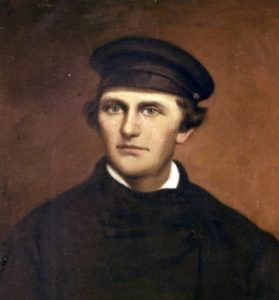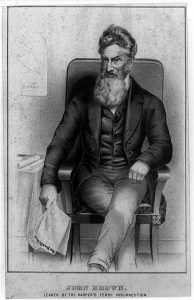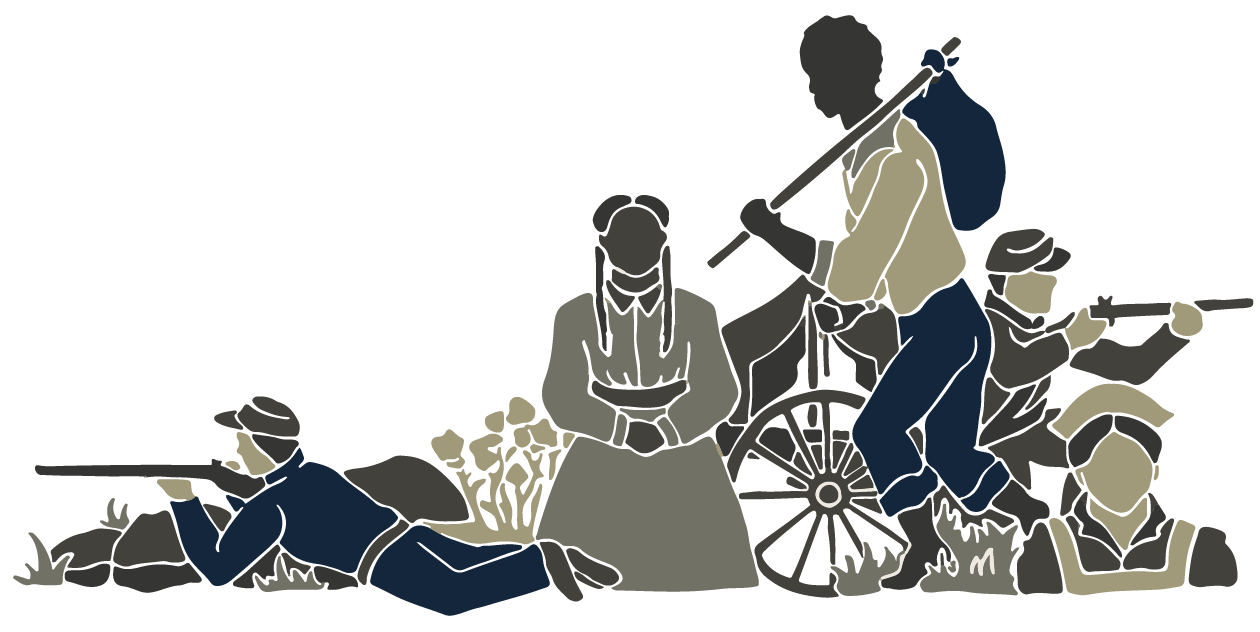by Alec Hoke
- Born April 25, 1811 in Lexington, VA.
- Founded the Virginia Military Institute in 1839 in Lexington.
- Anti-secessionist, supported gradual emancipation, but joined the Confederate Army when Virginia seceded in 1861.
- Served under Stonewall Jackson as Lieutenant Colonel. After the Civil War, served as Colonel in the militia.

John Thomas Lewis Preston was a soldier, educator, and Virginia gentleman for most of the nineteenth century. He attended undergraduate courses at Washington College, obtaining his degree in 1828 and went on to study at the University of Virginia and Yale. He trained in law and opened a practice in Lexington before founding the Virginia Military Institute in 1839.
The Virginia Military Institute was Preston’s life’s work, and for most of his life he would teach at the college, or work in some way to better it. Despite his reservations about slavery and secession, Preston would serve as a Lt. Col. in the Confederate Army during the Civil War in the 9th Virginia Infantry and as a Major in the VMI Corps of Cadets. After the war he continued to teach at the college until 1881, He died in 1890.
Through his education at Washington College, UVA, and Yale, Preston became a man who praised and welcomed discussion and debate. He sought a middle ground in many discussions, including that of slavery. As part of his participation in Lexington’s Franklin Society, a local debate organization, Preston would come to adopt and promote a concept of gradual emancipation of the slaves, funding endeavors to return groups of local slaves to Africa.

The Franklin Society also held numerous votes on whether Virginia should secede from the Union. Time after time, the Society voted no, in line with Preston’s own beliefs. At the execution of John Brown, an abolitionist who led the raid on the arsenal at Harpers Ferry in 1859, Preston stated to the militiamen and VMI cadets gathered around the gallows: “So perish all such enemies of Virginia! All such enemies of the Union! All such foes of the human race!” affirming both his loyalty to Virginia, and the United States. Preston believed that Virginia was better off as part of the Union, but would be loyal to his state to the end stating that he “would await the action of Virginia, and would, without hesitation, do whatever she though best should be done in the premises” with regards to secession.
One of the biggest questions that arises when studying the Civil War is Why? Why did the southern states decide it was best to secede, why did the north fight so hard to preserve the Union, and why did these men fight and die for the cause they chose? J.T.L. Preston is perhaps the perfect example of why men on both sides chose to fight because for him as for the others there was no single reason, and no perfect answer. Some fought to preserve the Union, some fought for a paycheck, some to try to free the slaves, and others to preserve the institution that had become vital to the south. Some, as is much the case with Preston, fought out of loyalty to their state. Preston wanted gradual emancipation of the slaves, he wanted to remain a part of the Union, and affirmed his opinion on the matter time and time again before the war. He was a man of reason and patience, but when the time came he sided with Virginia because for him and many others, there seemed to be no choice.
During the war Preston routinely sent letters to Col. Francis Smith, his superior, asking to be moved to a post where he would actually fight. His posts were mostly quiet, including a stint in Norfolk before returning to VMI to train new officers, and he narrowly missed quite a bit of action with Stonewall’s brigade—a fact he was acutely aware of. He practically begged to be allowed into the action, not because he adored violence or had a death wish, but because he felt it was his duty to do so. No one but Preston and Col. Smith ever knew about his requests, so it was not something he did to garner popularity with those around him; it was something Preston felt he must do as a Virginian and a soldier.
Scholars of the “Why they fought” question have come up with a number of reasons. One central reason is something called “primary group cohesion”; the idea that most soldiers fought out of loyalty to the comrades around them. This explanation undoubtedly has its merits, but the example of Preston suggests that “primary group cohesion” does not provide a full answer. Perhaps many joined out of fear of the ostracization that would come if they did not stick with the group; others no doubt fought for their own reasons, without regard to the rest.
John Thomas Lewis Preston epitomized the nineteenth-century gentlemanly ideal. He was well educated and placed high value on educational institutions, especially VMI. He was religious, serving as an elder in the Presbyterian Church for many years, and working with the church well past his retirement from the college. Most of all Preston was honorable, serving with distinction in the Virginia militia, the Confederate Army, and the Corps of Cadets. His sense of duty led to his joining the Confederate military despite his reservations about the major political issues. He expressed dislike for slavery, and was in support of Virginia remaining in the Union, but he served his state dutifully despite that. It is the complicated nature of his service, his joining despite his own reasons not to, that make Preston such a perfect example of why soldiers fought in the Civil War—because there is no all-encompassing answer.
Further reading
Allan, Elizabeth Preston, and Margaret Junkin Preston. The Life and Letters of Margaret Junkin Preston. Boston: Houghton and Mifflin, 1903.
Hamner, Christopher H. Enduring Battle: American Soldiers in Three Wars (1776-1945). Lawrence, KS: Kansas University Press, 2011.
McPherson, James M. For Cause and Comrades: Why Men Fought in the Civil War. New York: Oxford University Press, 1997.
Shaffner, Randolph P. The Father of Virginia Military Institute: A Biography of Colonel J.T.L. Preston, CSA. Jefferson, North Carolina: McFarland & Company, Inc., Publishers, 2014.
About the project
This page was created as part of an undergraduate research seminar taught in the Virginia Tech History Department by Professor Paul Quigley in Fall 2015. Follow the link to return to the course homepage: The Preston Family: Civil War Experiences.
